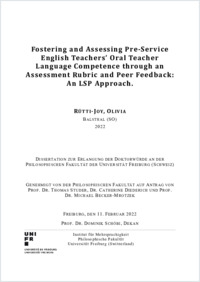Fostering and Assessing Pre-Service English Teachers’ Oral Teacher Language Competence Through an Assessment Rubric and Peer Feedback : An LSP Approach
SPR
- Rütti-Joy, Olivia
- Studer, Thomas (Degree supervisor)
- Fribourg, Switzerland, 2022
1 ressource en ligne (371 pages) ; 1 fichier pdf
Thèse: Université de Fribourg (Suisse), 2022
Profession-related language competences
Teacher language competence
Language teacher education,
Oral feedback competences
L2 speaking performance
Performance test
Peer-feedback,
Feedback literacy
Learning with rubrics
E-portfolio
English
Multitudes of factors influence a language learners’ success in acquiring an additional language in school. One of those constitutes L2 teachers’ language competences in the target language they intend to teach (Vicente, 2012). In addition to high general L2 proficiency, specific, profession-related language competences are receiving increasing interest. For instance, recent theoretical considerations and empirical research suggest that teacher language competence is distinct from general language competence (Cullen, 1998). Indeed, high general and academic language proficiency do not seem to suffice to ensure effective, action-oriented and target-audience appropriate teaching (Bleichenbacher et al., 2017; Bleichenbacher et al., 2014; Burke, 2015; Elder, 2001; Legutke, 2012; Loder-Büchel, 2014). With the rise of competence- and standard-orientation in education, an increasing focus is placed on needs-oriented approaches to identify what L2 teacher language competences are actually required in the real-world classroom. One such needs- and action-oriented attempt constitutes the development of the profession-related language competence profiles (PRLCP) and the corresponding analytical profession-related language competence assessment rubric (PRLC-R) (Kuster et al., 2014). They were devised within a nation-wide Swiss development project and describe the specific language requirements for L2 teachers according to a range of profession-specific communicative skills such as preparing and conducting lessons or assessing, giving feedback and advising (ibid.). The latter constitutes a central component of fostering learners’ L2 skills and is considered a particularly typical, profession-related skill for (L2) teachers (Bleichenbacher et al., 2014). Acquiring the linguistic means of being able to engage in effective L2 feedback practice thus seems of particular relevance for L2 teachers. According to socio-constructivist approaches to L2 education, in which feedback is conceptualised as a multidirectional, collaborative and iterative process, both the feedback provider and recipient take on mutual responsibilities for co-constructing meaning and thus for contributing to successful, dialogic feedback conversations (Carless, 2020a; Carless & Boud, 2018). Accordingly, high language proficiency – particularly of the L2 teacher – are especially relevant to ensure successful reciprocal feedback. Examining how feedback-related teacher language competences can be fostered thus seems to be a necessary step when it comes to exploring the PRLCP in context. So far, very little accompanying empirical research has been conducted to determine practicality, usability, impact and effectiveness of the PRLCP and PRLC-R in practice. This dissertation examines the practical implementation and systemic relevance of both instruments in two partial studies. By means of a quasi-experimental intervention study of pre-post experimental-control design, partial study 1 investigates how qualitative, language-specific aspects of pre-service English teachers’ oral feedbacks provided to lower secondary school students develop under the administration of the PRLC-R in combination with systematic feedback training. The treatment involves the experimental group providing regular feedback on their peers’ microteachings based on the PRLC-R including linguistic and indigenous criteria (e.g., addressee-specificity). The control group identify their own assessment criteria for providing peer feedback. To measure the 48 participating pre-service teachers’ oral, profession-related feedback competences in English, an online competence-oriented performance test is used. The pre- and post-tests are based on the PRLCP as the test construct and contain vignette-based test tasks to simulate the target language use domain and elicit relevant oral language performances. The audio-recorded task responses are judged against the PRLC-R criteria by four expert raters. Partial study 2 seeks to answer the overarching research question of how lower secondary school students (i.e. “field experts”) perceive and evaluate the linguistic quality and comprehensibility of pre-service English teachers’ oral feedbacks. The aim of this sub-study is to explore the perceptions of the end users as stakeholders. The learner judgements are captured through semi-structured, guided interviews. Connections to the PRLCP and the corresponding expert ratings are drawn. Results of the interrater reliability calculations and rater analyses of partial study 1 show that interrater reliability could not be achieved. In addition, the Multifaceted Rasch Analysis (MFRA) indicates noticeable rater and interaction effects and severe differential rater functioning, suggesting that the PRLC-R criteria are not distinct and reliably applicable throughout. In addition, despite correcting the rater biases and variability through an MFRA, the pre-post analyses show that no treatment effects can be observed in the experimental group. The control group’s measured oral, profession-related feedback competences increased by a small, albeit non-significant amount. Findings from partial study 2 indicate that the indigenous criterion addressee-specificity may constitute its own independent construct. The insights gained through the intervention study and qualitative interviews serve to identify the potential affordances of the PRLCP. The findings also aid to recognise areas for further development of the PRLCP, PRLC-R and the indigenous criterion addressee-specificity. Implications on the construct of teacher language competence and L2 teacher education are drawn, didactic, methodological and theoretical considerations are presented, avenues for further research are outlined and the need for more accompanying empirical research in development projects are discussed.
- Faculty
- Faculté des lettres et des sciences humaines
- Language
-
- English
- Classification
- Education, teaching
- License
-
License undefined
- Open access status
- gold
- Identifiers
-
- SWISSCOVERY 991170875282305501
- URN urn:nbn:ch:rero-002-120975
- Persistent URL
- https://folia.unifr.ch/unifr/documents/319592
Statistics
Document views: 1176
File downloads:
- Rütti-JoyO: 1101
